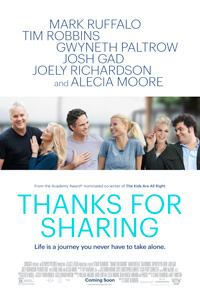Shame Game: Blumberg’s Debut Valiantly Wades Through Sex Stigma
 A cross section of multiple story lines concerning three recovering sex addicts creates a seriously effective empathy for its characters in Thanks for Sharing, making this a much warmer and palatable portrait which was coldly and angrily depicted by the hard, desperate thrusting of Michael Fassbender in Steve McQueen’s Shame (2011). The directorial debut of screenwriter Stuart Blumberg (The Kids Are All Right, 2010), once again shows he clearly has a knack for writing likeable and believably flawed individuals, and until a predictably clichéd finale, he bluntly tackles his subject matter, though this isn’t always handled with much finesse. At the very least, this surprisingly heavy triptych puts a human face to a stigmatized subject.
A cross section of multiple story lines concerning three recovering sex addicts creates a seriously effective empathy for its characters in Thanks for Sharing, making this a much warmer and palatable portrait which was coldly and angrily depicted by the hard, desperate thrusting of Michael Fassbender in Steve McQueen’s Shame (2011). The directorial debut of screenwriter Stuart Blumberg (The Kids Are All Right, 2010), once again shows he clearly has a knack for writing likeable and believably flawed individuals, and until a predictably clichéd finale, he bluntly tackles his subject matter, though this isn’t always handled with much finesse. At the very least, this surprisingly heavy triptych puts a human face to a stigmatized subject.
Three different stages of dealing with sex addiction are depicted in the lives of three men that belong to the same recovery group. Mike (Tim Robbins), a small time business owner happily married to his high school sweetheart Katie (Joely Richardson) is a wizened senior in the group, and the sponsor of Adam (Mark Ruffalo), an environmental consultant five years sober stabilized enough to consider the possibility of dating again. One of the newest members of their group is Neil (Josh Gad), an ER doctor that has been court sanctioned to attend sessions. It’s clear Neil isn’t quite ready to accept that he has a problem and a drastic incident results in much needed wake up call, though another recent addition to the group, Dede (Alecia Moore, aka Pink) tries to help him through. Meanwhile, Adam meets a flirty blonde at a party named Phoebe (Gwyneth Paltrow), and their instantaneous chemistry makes it difficult for Adam to reveal necessary information about himself. At about the same time, Mike’s estranged son, Danny (Patrick Fugit), suddenly returns, himself now a recovering addict. Each of them will navigate through tragic and hopeful new circumstances, providing closure and a chance at personal growth.
As was the demise of the soon-to-be released theatrical cut of Joseph Gordon Levitt’s Don Jon, background clips of pornography being consumed by its main characters are blurred, brief, and distanced from our view (to avoid the terror of the NC-17 rating). Even in a film depicting a recognized disease, censorship reigns supreme, which, sad to say, is why this empathetic portrayal is less effective than the aforementioned McQueen title.
Sex, considered by many to be one of life’s supreme joys, yet still a notable taboo, presumably can’t be presented in frank, visual detail because middle America continues to reject realities of human desire (and presumably won’t pay to see lurid realities). Therefore, that monstrous desire of Ruffalo’s character can’t quite sprout wings in Blumburg’s arena, though he tries valiantly with a scene that degenerates quickly into forced melodrama involving a sexual role-playing exchange with a much younger female. One character aptly compares the disease to having a crack addiction with a smoking pipe attached to one’s body. Like an addiction to food, we’re dealing with something necessary to our livelihood and enjoyment as human beings, yet how we can see, experience, engage or even learn about sexuality is thwarted by archaic societal mores. Thus the medium of cinema will forever be at odds with its depictions of sexual lives, our most realistic examples generally in the form of boundary pushing arthouse films that explore the broken, cruel realities of such an addiction. Thanks For Sharing isn’t meant to and isn’t trying to break these barriers, but the very core of its presentation is diluted by appropriate standards of dramatic taste, forcing the material into the formula kennel in order to culminate in come type of closure.
Blumberg insistently injects a rosy hued finale, and while abject hopelessness certainly isn’t necessary, we’re left with a predictable trajectory of punishment and reward, not to mention neat and contrived reconciliations for all involved. But despite all of that, there’s an unmistakable warmth and care brought to Thanks for Sharing, most evident in a few performances not worth missing. Ruffalo is fascinating as a sex addict attempting to date again, and there’s a surprising charisma and energy he shares with Paltrow. At first the cloying comic relief, Gad becomes a fully fleshed character of intrigue, even managing to form a believable friendship with Pink, who does her best not to be distracting. Tim Robbins and Fugit get saddled with the tired estranged father/son routine, and all three storylines have notable instances of clunky passages. One can’t overlook the dramatic weight of several moments in Thanks For Sharing, but a glossy ending nullifies its notable elements.


